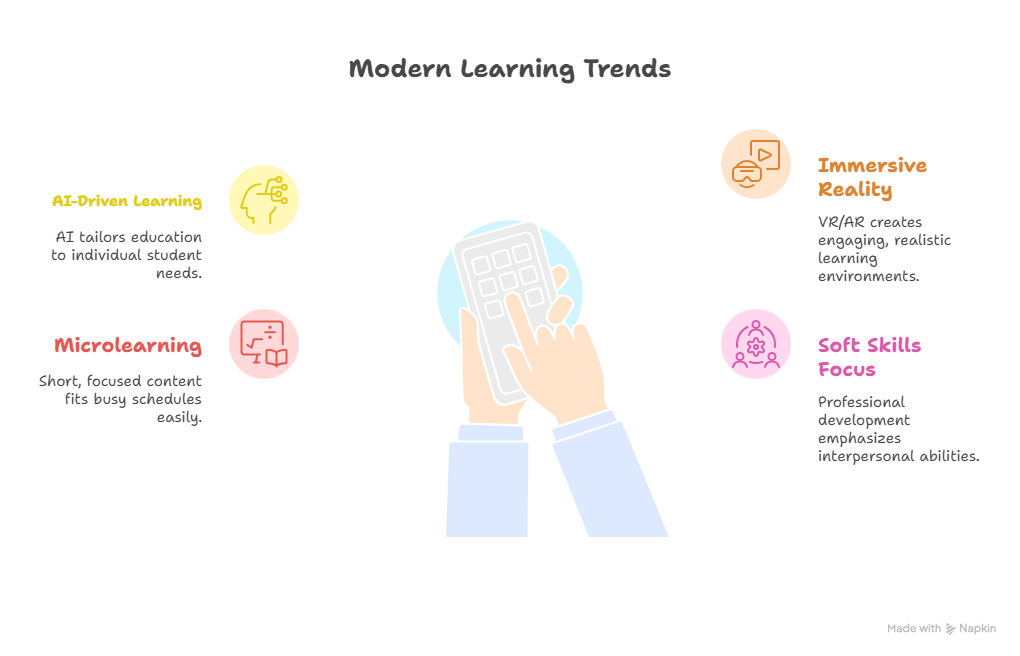The online education landscape is rapidly evolving, with over 200 million students worldwide embracing online learning in 2024 alone. As we step into 2025, selecting the right online course has become a crucial decision for those seeking to enhance their skills or advance their careers.
With numerous options available, it can be overwhelming to navigate the vast array of online courses. Effective online learning selection requires a strategic approach, considering factors such as course relevance, accreditation, and flexibility.
Making an informed decision when choosing an online course is vital. This article will guide you through the key considerations, empowering you to make the best choice for your educational and professional goals.
The Evolving Landscape of Online Education in 2025
Online education is evolving rapidly in 2025, with new trends and technologies redefining the digital learning experience. The integration of advanced technologies is enhancing the quality and accessibility of online courses.
Current Trends in Online Learning for 2025
Some of the current trends include:
- Personalized learning experiences through AI-driven adaptive learning systems
- Increased use of virtual and augmented reality for immersive learning
- Microlearning and bite-sized content for flexible learning schedules
- Growing emphasis on soft skills and professional development

New Technologies Shaping Digital Education
Technologies such as AI, blockchain, and virtual reality For instance, AI is being used to create intelligent tutoring systems, while blockchain is being explored for secure credentialing.
These advancements are making online learning more engaging, accessible, and effective.
How to Choose Online Course That Matches Your Goals
With the numerous online courses available, choosing the one that aligns with your objectives requires careful consideration. To make an informed decision, it’s essential to follow a structured approach.
Identifying Your Learning Objectives
The first step in selecting an online course is to clearly define your learning objectives. What do you want to achieve? Are you looking to acquire new skills, enhance your knowledge in a specific area, or advance your career? Tips for selecting online courses include considering what you hope to gain from the course and how it will help you achieve your goals.
Aligning Courses with Career Aspirations
Once you’ve identified your objectives, the next step is to find courses that align with your career aspirations. Research the course curriculum and ensure it covers the topics you’re interested in. Consider the course’s relevance to your career goals and whether it provides the skills or knowledge required in your industry.
Assessing Your Available Time and Learning Style
It’s also crucial to assess your available time and learning style. Online courses vary in duration and format. Some may require a significant time commitment, while others are more flexible. Consider whether you prefer video-based learning, interactive sessions, or text-based materials. Online education decision making involves weighing these factors to choose a course that fits your lifestyle and learning preferences.
| Course Feature | Description | Importance |
|---|---|---|
| Course Content | Relevance and depth of the course material | High |
| Learning Format | Video, text, or interactive based | Medium |
| Duration | Length of the course | High |
Key Factors to Evaluate Before Enrolling
To ensure a successful online learning experience, several factors must be assessed beforehand. When picking the right online course, it’s essential to consider various elements that impact your learning outcomes.
Instructor Credentials and Teaching Methodology
The expertise and teaching approach of the instructor can significantly influence your learning experience. Look for courses taught by industry experts with a proven track record. Check for credentials and read about their teaching methodology to ensure it aligns with your learning style.
Course Content Quality and Structure
High-quality course content is crucial for effective learning. Evaluate the course structure, ensuring it is logical and easy to follow. Well-organized content enhances your ability to absorb and retain information.
Cost Considerations and Return on Investment
Assessing the cost of the course and its potential return on investment is vital. Consider the course fee in relation to the skills and knowledge you will gain. Evaluate the potential career benefits and how they align with your career aspirations.
Platform Reliability and User Experience
The reliability and usability of the learning platform can greatly affect your learning experience. Ensure the platform is stable, user-friendly, and accessible on various devices. A smooth user experience is crucial for uninterrupted learning.
Student Reviews and Success Metrics
Student reviews and success stories provide valuable insights into the effectiveness of a course. Look for reviews from previous students to gauge the course’s quality and impact. Success metrics such as completion rates and job placement statistics can also indicate the course’s value.
Make an Informed Decision
Choosing the right online course can be a daunting task, but by carefully considering your goals, available time, and learning style, you can make an informed decision. When comparing online courses, look for programs that align with your career aspirations and offer high-quality content.
To ensure a successful learning experience, evaluate factors such as instructor credentials, course structure, and platform reliability. By doing so, you’ll be well on your way to selecting an online program that meets your needs. For effective online course comparison, consider seeking selecting online programs advice from experts or reviews from past students.
Ultimately, taking the time to research and compare online courses will pay off in the long run, leading to a more fulfilling and productive learning experience.
FAQ
What are the key factors to consider when choosing an online course?
When selecting an online course, consider factors such as instructor credentials, course content quality, cost, platform reliability, and student reviews to ensure you make an informed decision.
How do I identify my learning objectives for online learning?
To identify your learning objectives, reflect on your career aspirations, available time, and learning style, and align them with the course goals and outcomes.
What role do emerging technologies play in online education?
Emerging technologies like AI, virtual reality, and others are enhancing the online learning experience, making it more engaging, interactive, and effective.
How can I assess the quality of an online course?
Assess the quality of an online course by evaluating its content, structure, and relevance to your learning objectives, as well as the instructor’s teaching methodology and credentials.
What is the importance of student reviews in choosing an online course?
Student reviews provide valuable insights into the course’s effectiveness, helping you make an informed decision by understanding the experiences of previous learners.
How do I evaluate the return on investment for an online course?
To evaluate the return on investment, consider the course cost, potential career advancement, and expected salary increase, and weigh these against the course’s quality and relevance.
What should I look for in an online learning platform?
When selecting an online learning platform, look for reliability, user experience, accessibility, and features that support your learning style, such as mobile compatibility and interactive tools.

